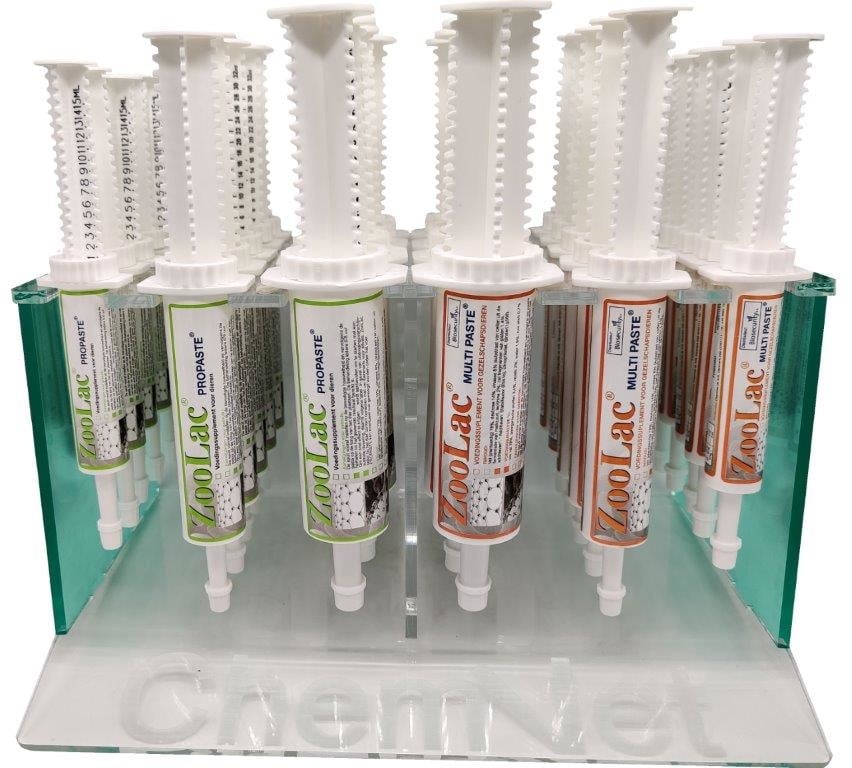- All products are added to your cart.
Diarrhea in dogs, cats, and other pets
Diarrhea
Why does my pet have diarrhea?
In the small intestine, food is digested, and anything not filtered by the small intestine ends up in the large intestine. The large intestine extracts moisture from the remaining substances and stores the feces. If the mucous membrane of your dog, cat, rabbit, or other pets' intestines becomes irritated, it can cause diarrhea. When your pet's body senses something in its intestines that shouldn't be there, it will try to eliminate it as quickly as possible. If this is in the upper digestive tract, your pet may vomit. If it's further down, it will most likely cause diarrhea.
Small Intestine Diarrhea 
In the small intestine, nutrients and fluids are extracted from food, thickening the contents. If the small intestine is not functioning properly, the contents will retain a lot of fluid, resulting in relatively thin diarrhea. This type of diarrhea can usually be controlled reasonably well, and pets may indicate when they need to go. There is generally no blood or mucus in the stool. Small intestine diarrhea often comes with flatulence, poor appetite, vomiting, and abdominal pain. Pets with small intestine diarrhea may lose weight despite eating enough.
Large Intestine Diarrhea
In the large intestine, more moisture is removed from the stool, which then moves to the rectum. In the last part of the large intestine, the rectum, the stool waits until the pet defecates. This is also where the urge to defecate is regulated. With large intestine diarrhea, most of the moisture has already been removed in the small intestine. The mushy stool arriving in the large intestine is quickly pushed to the rectum, causing a strong and sudden urge to defecate. Large intestine diarrhea is generally thicker in consistency than small intestine diarrhea. Usually, there is mucus and/or blood in the stool, and sometimes, excessive mucus production leads to pets passing only (bloody) mucus. If the dog continues to eat well, weight loss is generally not a concern.
Possible Causes of Diarrhea:
-
Dysbacteriosis in the intestines: Bacteria in the intestines, along with enzymes, contribute to proper digestion. Imbalances can occur due to sudden diet changes, prior periods of diarrhea, or increased presence of certain bacteria caused by antibiotics. Probiotics can help restore balance.
-
Stress: Stress releases hormones that affect the digestive system. Dogs may experience vomiting and diarrhea. Reducing stress factors is the solution. Stress-induced diarrhea often involves increased urgency, and pets may struggle to hold their stool, particularly in puppies.
-
Poor Digestion, Food Allergy: Enzymes break down nutrients in food. Deficiencies can lead to undigested nutrients in the intestines, damaging the lining and causing diarrhea, abdominal pain, and flatulence.
-
Parasites: Parasitic infections, such as Giardia, can damage the intestinal wall, preventing proper nutrient absorption. Symptoms may include blood or mucus in the stool. Contact a vet for suspected parasitic infections.
What to Do When Your Dog or Cat Has Diarrhea: Since diarrhea is often caused by dysbacteriosis, restoring gut flora is crucial. Probiotics are beneficial bacteria promoting gut health, and prebiotics stimulate specific bacteria in the intestines.
Zoolac is a probiotic with unique bacterial strains, easily absorbed by dogs, cats, or rabbits. Zoolac Propaste stimulates the growth of acidogenic bacteria, promoting the growth and action of lactic acid bacteria, with a prebiotic effect. It does not contain "stop" agents, making it suitable for preventive use. Additionally, it is a natural product and cannot be overdosed.


